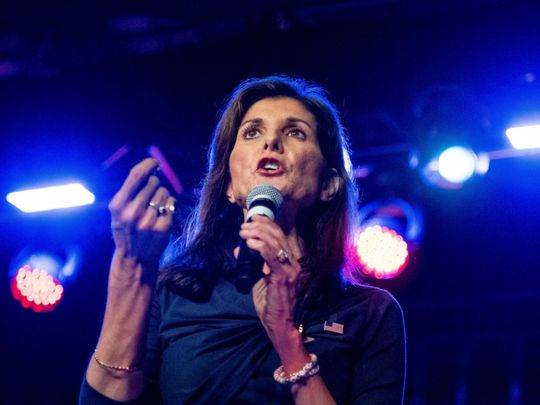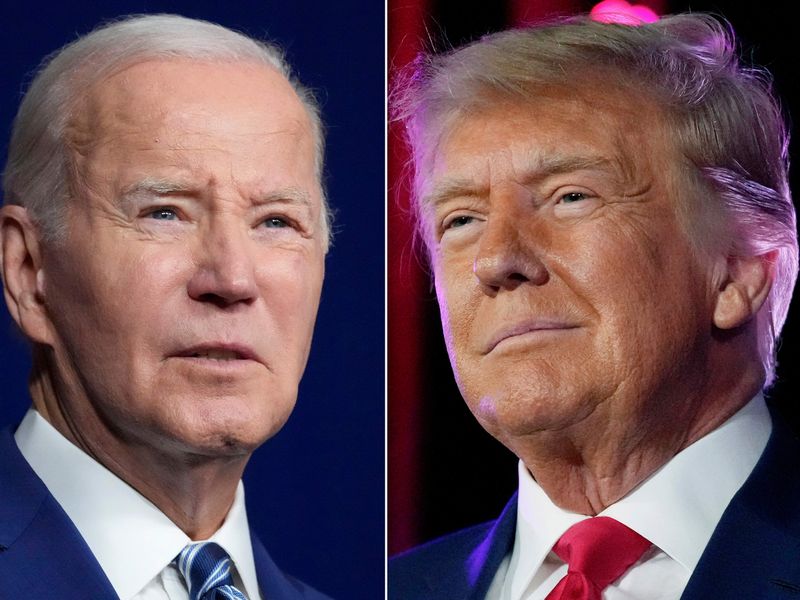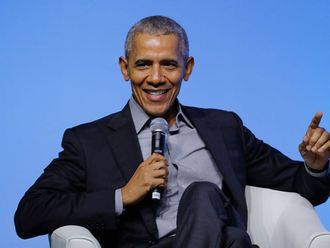
Washington: CHARLESTON, South Carolina: Nikki Haley ended her long-shot challenge to Republican presidential frontrunner Donald Trump on Wednesday, ensuring the former president will be the party’s candidate in a rematch with Democratic President Joe Biden in November’s election.
Haley, the former South Carolina governor and Trump’s ambassador to the United Nations when he was president, made the announcement in a speech in Charleston a day after Super Tuesday, when Trump beat her soundly in 14 of 15 Republican nominating contests.

“The time has now come to suspend my campaign,” Haley said.
“I have no regrets.” Haley lasted longer than any other Republican challenger to Trump but never posed a serious threat to the former president, whose iron grip on the party’s base remains firm despite multiple criminal indictments.
The rematch between Trump, 77, and Biden, 81 - the first repeat US presidential contest since 1956 - is one that few Americans want. Opinion polls show both Biden and Trump have low approval ratings among voters.
he election promises to be deeply divisive in a country already riven by political polarization. Biden has cast Trump as an existential danger to democratic principles, while Trump has sought to re-litigate his false claims that he won in 2020.
Haley, 52, drew support from deep-pocketed donors intent on stopping Trump from winning a third consecutive Republican presidential nomination, particularly after she notched a series of strong performances at debates that Trump opted to skip.
She ultimately failed to pry loose enough conservative voters in the face of Trump’s dominance.
But her stronger showing among moderate Republicans and independents highlighted how Trump’s scorched-earth style of politics could make him vulnerable in the Nov. 5 election against Biden.
Here are some facts about Haley’s life and political career:
DAUGHTER OF IMMIGRANTS Haley, 52, gained a reputation in the Republican Party as a solid conservative with an ability to address issues of gender and race in a more credible fashion than many of her peers. At the same time, she has drawn criticism for her ambiguous positions on some major policy issues.
She is the daughter of two immigrants from India who ran a clothing store in rural South Carolina, and she has spoken occasionally about the discrimination her family faced.
Haley graduated from Clemson University in 1994 with a degree in accounting and helped expand her parents’ clothing business.
She took on leadership roles in several business organizations before winning a seat in the South Carolina state legislature in 2004. She is married and has two children.
SOUTH CAROLINA GOVERNOR Elected South Carolina’s governor in 2010, Haley became the first woman to hold that post in the Deep South state and the second person of Indian descent to serve as a state governor in the United States.
She received national attention in 2015 when she signed a bill into law removing the Confederate battle flag from the grounds of the South Carolina state capitol following the murder of nine black churchgoers by white supremacist Dylann Roof. But she later drew criticism from some elected officials for describing the flag as a symbol of heritage for some Southerners.
Haley appointed Tim Scott, then a US representative from South Carolina, to the US Senate in 2012. Scott was a rival for the presidential nomination, but he dropped out of the primary race in early November after struggling to gain traction in opinion polls and later endorsed Trump.
UNITED NATIONS AMBASSADOR Haley endorsed several rivals to Trump in the 2016 Republican presidential nominating contest and occasionally tangled with him during the primaries.
But she then went on to serve for two years as his ambassador to the United Nations. During that time, the US pulled out of the Iran nuclear deal, an accord that was unpopular with Republicans.
2024 PRESIDENTIAL CAMPAIGN Haley was among the first candidates to enter the race, announcing her challenge to Trump last February after earlier saying she would not run against him.
While she enjoyed a brief bump in opinion polls, she subsequently languished in the mid- to lower single digits in most national and state-level surveys, until the first debate gave her a measurable boost starting in late August.
In late November, she received a major boost when the conservative political network led by billionaire Charles Koch endorsed her bid.
She sought to distinguish herself as the most capable contender on foreign policy. While almost all Republican candidates staked out a tough position on China, Haley’s unabashed support for Ukraine represented a contrast with Trump, who says the conflict is not central to US national security.
Late last year she drew rebukes from Democrats and some of her rivals when, in answer to a question, she declined to say that slavery was one of the main causes of the U.S. Civil War, an omission she sought to correct a day later.
RELATIONSHIP WITH TRUMP Trump was furious that Haley refused to leave the race after losing to him in New Hampshire and Iowa.
After months of carefully calibrating her criticism of Trump and resisting growing pressure from allies to go after him harder, she began to attack him forcefully, questioning his mental acuity and his age - he is 77 - and accusing him of throwing temper tantrums.
For his part, Trump insulted her intelligence, calling her “birdbrain” and mocking her Indian heritage, and said he would not consider her for vice president. She has said she would not want to be his running mate.
Still, she said as president she would pardon Trump if he were convicted. Trump faces four criminal cases, including over efforts to overturn the 2020 election and his handling of national security documents. --- Reuters
HALEY PUT EMPHASIS ON FOREIGN POLICY
Drawing on her foreign-policy experience as U.N. ambassador, Haley said throughout her campaign that the United States must help Ukraine defend itself against Russian aggression, a position at odds with Trump.
There was no indication Trump would moderate his message.
“He’ll continue to focus on the issues that matter: immigration, economy, foreign policy,” Karoline Leavitt, press secretary for the Trump campaign, said late on Tuesday.
Biden has his own baggage, including widespread concern about his age. Three-quarters of respondents in a February Reuters/Ipsos poll said he was too old to work in government, after already serving as the oldest U.S. president in history.
About half of respondents said the same about Trump.

KEY ISSUES
As in 2020, the race is likely to come down to a handful of swing states, thanks to the winner-take-all, state-by-state Electoral College system that determines the presidential election. Arizona, Georgia, Michigan, Nevada, North Carolina, Pennsylvania and Wisconsin are all expected to be closely contested in November.
The central issues of the campaign have already come into focus. Despite low unemployment, a red-hot stock market and easing inflation, voters have voiced dissatisfaction with Biden’s economic performance.
Biden’s other major weakness is the state of the U.S.-Mexico border, where a surge of migrants overwhelmed the system after Biden eased some Trump-era policies. Trump’s hawkish stance on immigration - including a promise to initiate the largest deportation effort in history - is at the core of his campaign, just as it was in 2016.
Voters expect Trump would do a better job on both the economy and immigration, according to opinion polls.
Republican lawmakers, egged on by Trump, rejected a bipartisan immigration enforcement bill in February, giving Biden an opportunity to argue that Republicans are more interested in preserving the southern border as a problem rather than finding a solution.
Democrats are also optimistic that voter sentiment on the economy will shift in Biden’s favor if economic trends go on rising throughout 2024.
Trump may be dogged by criminal charges throughout the year, though the schedule of his trials remains unclear. The federal case charging him with trying to overturn the 2020 election, perhaps the weightiest he faces, has been paused while Trump pursues a long-shot argument that he is immune from prosecution.
While most Republicans view his indictments as politically motivated, according to Reuters/Ipsos polling, about a quarter of Republicans and half of independents say they won’t support him if he is convicted of a crime before the election.
Biden has said Trump poses a threat to democracy, citing the Jan. 6, 2021, attack on the U.S. Capitol by a mob of Trump supporters seeking to reverse Biden’s 2020 victory.
Abortion, too, will play a crucial role after the nine-member U.S. Supreme Court, buoyed by three Trump appointees, eliminated a nationwide right to terminate pregnancies in 2022. The subject has become a political liability for Republicans, helping Democrats over-perform expectations in the 2022 midterm elections.
Abortion rights advocates have launched efforts to put the issue before voters in several states, including the battleground of Arizona.
HALEY THWARTED
Haley had been among the first Republican contenders to enter the race in February 2023, but she was largely an afterthought until garnering attention for her standout debate performances later in the year.
Through it all, she was reluctant to completely disavow her former boss, having served as his U.N. ambassador. Trump showed no such reticence, frequently insulting her intelligence and Indian heritage.
Only in the last months of her campaign did Haley begin to forcefully hit back at Trump, questioning his mental acuity, calling him a liar and saying he was too afraid to debate her.
In the final weeks of the campaign, she became the standard-bearer for the anti-Trump wing of the party, a dramatic evolution for someone who just months earlier praised the former president in her stump speeches.
Still, she said that as president she would pardon Trump if he were convicted in any of the criminal cases he faces, a position she has never abandoned.










_resources1_16a30b3523c_small.jpg)

